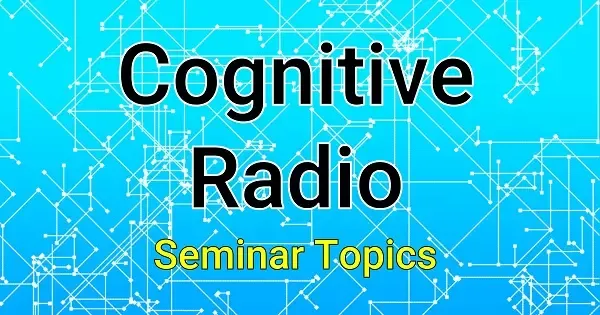Cognitive Radio
The term cognitive radio (CR) was invented by Joseph Mitola (Mitola et al., 1999). CR refers to a software-based radio system which is capable of sensing factors in its environments such as geographical location and the RF characteristics of other radio devices in the same locale, the CR device can then alter its power, frequency, modulation, and other parameters to dynamically reuse available radio spectrum (Mannion, 2004). Cognitive radio can monitor, observe, and react to events in a specified environment.
 |
| Block diagram of Cognitive Radio |
The fundamental benefits are the ability to self-adapt, self-manage, and self-optimize under normal conditions, and the ability to self-diagnose and self-heal when unusual problems arise e.g. base stations can automatically adjust operating range (e.g., by controlling transmit power, receiver sensitivity, data rate, frequency channel selection) to compensate for neighboring base stations that fail.
Cognitive Radio Seminar Topics | IEEE Papers and Journals
Download PDF research papers and IEEE papers for your seminar report. Select the topic according to your interest and download the documents to study. The IEEE papers on cognitive radio help you to learn more about this technology.
Cognitive Radio (PDF)
Cognitive Radio Networking and Communications: An Overview (IEEE Paper)
Role of Cognitive Radio in 5G (PDF)
Cognitive Radio: Brain-Empowered Wireless Communications (IEEE Paper)
Cognitive Radio Networks: An Information-Theoretic Perspective (PDF)
Achievable Rates in Cognitive Radio Channels (PDF)
Optimal Linear Cooperation for Spectrum Sensing in Cognitive Radio Networks (IEEE Journal)
Cognitive Radio: An Integrated Agent Architecture for Software Defined Radio (PDF)
Some Fundamental Limits on Cognitive Radio (PDF)
Security Challenges in Cognitive Radio Networks (PDF)
Cognitive Radio for Flexible Mobile Multimedia Communications (PDF)
Analog to Digital Cognitive Radio: Sampling, Detection, and Hardware (PDF)
A New Achievable Rate Region for the Cognitive Radio Channel (PDF)
Secure Beamforming in 5G-Based Cognitive Radio Network (PDF)
Spectrum Sensing Algorithms for Cognitive Radio Applications (IEEE PDF)
Spectrum Management in Cognitive Radio Networks (IEEE PDF)
Multimedia Communication over Cognitive Radio Networks from QoS/QoE Perspective (PDF)
Spectrum Sensing Techniques for Cognitive Radio (PDF)
Multiple-Input/Multiple-Output (MIMO) Systems Using Cognitive Radio Frequency (PDF)
Spectrum Inference in Cognitive Radio Networks: Algorithms and Applications (IEEE Paper)
A Proposed Algorithm to Enhance Security in CRN (PDF)
Clustering in Multi-Channel Cognitive Radio Ad Hoc and Sensor Networks (PDF)
Effective Analysis of Matched Filter Technique in Cognitive Radio (PDF)
Spectrum Decision Framework to Support Cognitive Radio Based IoT in 5G (PDF)
Context-Based Spectrum Sharing in 5G Wireless Networks Based on Radio Environment Maps (PDF)
Compressive Spectrum Sensing for Cognitive Radio Networks (Full Thesis PDF)
Cognitive Radio Based Spectrum Sensing Techniques (PDF)
A Cognitive Radio System For E-health Applications in a Hospital Environment (PDF)
Cognitive radio has the potential to allow multidimensional reuse of spectrum in space, frequency and time and remove the spectrum and bandwidth limitations that slowed broadband wireless development around the world. Cognitive Radio is poised to take advantage of the increasing deregulation of the radio spectrum to provide high-speed broadband services. It can potentially lead to virtually unlimited wireless bandwidth when the spectrum is used and reused more efficiently and co-operatively and ultimately increase capacity and efficiency as a direct result of being able to switch between momentarily idle channels in different portions of radio spectrum for a short period of usage.


0 comments